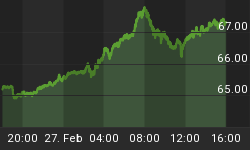News coming out lately on domestic economic activity has showed continued albeit slowed improvement, following the trend of stagnation which has formed over the past several weeks. Numbers continue to show a shortage and cars and skilled labor, while construction spending has advanced and consumer spending has reached its highest levels since 2008.
Still, recent increases have been slower than earlier in this recovery, hinting that economic growth in this country is continuing to stagnate. This stagnation has had an impact on the markets, with intraday volatility higher than normal and volatility indices - which tend to measure investor fears of a market decline - rising accordingly.
At the same time, interest rates have continued to rise, revealing investors' limited appetite for risk. Rising rates have also led to mounting losses in fixed income products, sending many investors scattering.
[As a side note, investors need to understand that we are on the verge of what will likely amount to at least a 10-15 year rising interest rate environment. For this reason, the strategy investors have used over the past 15-20 years of collecting interest payments and watching bond prices rise as interest rates fall, will no longer work. Investors either need to find a new strategy for living in a new rising-rate environment - one that they can live with - or they need to leave the bond market behind.]
While money has been flowing out of bond funds as a result, flows into equities have been comparatively small, indicating that investors are not reinvesting everything they redeem from bond liquidations.
Instead, numbers seem to suggest that investors are beginning to look for new opportunities to deploy capital locally - such as through small, private businesses.
Admittedly, investors can typically earn a far better return on their money in such small businesses, as opposed to the market - assuming their venture is successful.
In all likelihood, small business is going to be the area where most growth occurs for the next several years. As small business constitutes the "backbone" of the domestic economy, this would be a tremendous advantage for the US.
In fact, if the growing trend away from bonds and towards small, private, local investments continues to expand, it's quite possible that the United States is on the cusp of a long-term economic expansion, which will begin to pick up steam once near-term stagnation is behind us.
Unfortunately, this trend will also likely lead to the return of inflation in this country, which could be the major concern for baby boomers now nearing or entering retirement.















